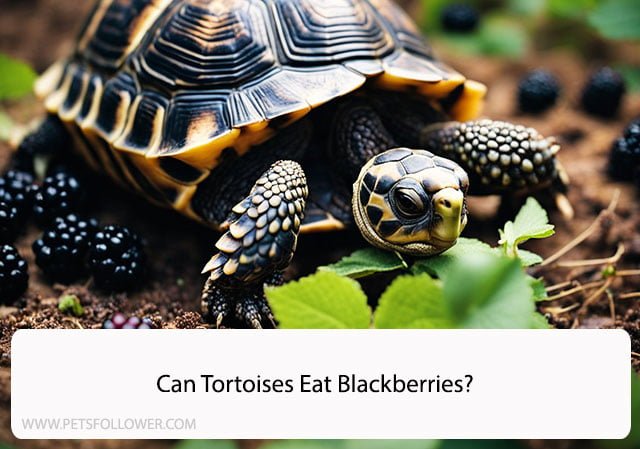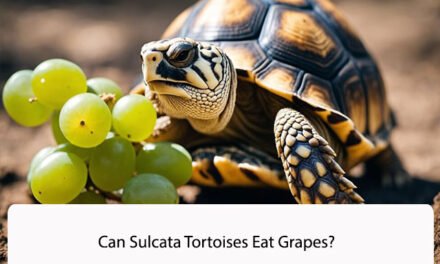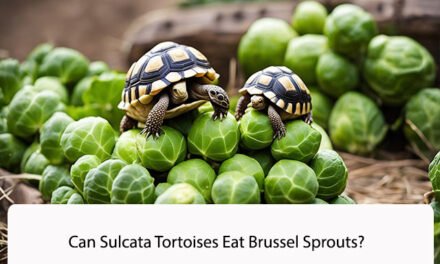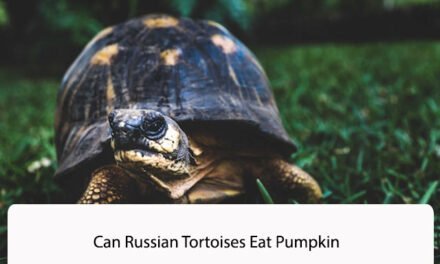Tortoises are herbivores and enjoy a varied diet of fruits and vegetables. As owners, we want to make sure that we are providing them with the right kind of food that is both nutritious and safe for them to consume. One question that may come to mind is whether tortoises can eat blackberries.
Blackberries are a delicious and nutritious fruit that many of us enjoy eating. However, when it comes to feeding our tortoises, we need to be cautious as not all fruits and vegetables are safe for them to consume. In this article, we will explore whether tortoises can eat blackberries and what the potential risks and benefits are.
What Are Blackberries?
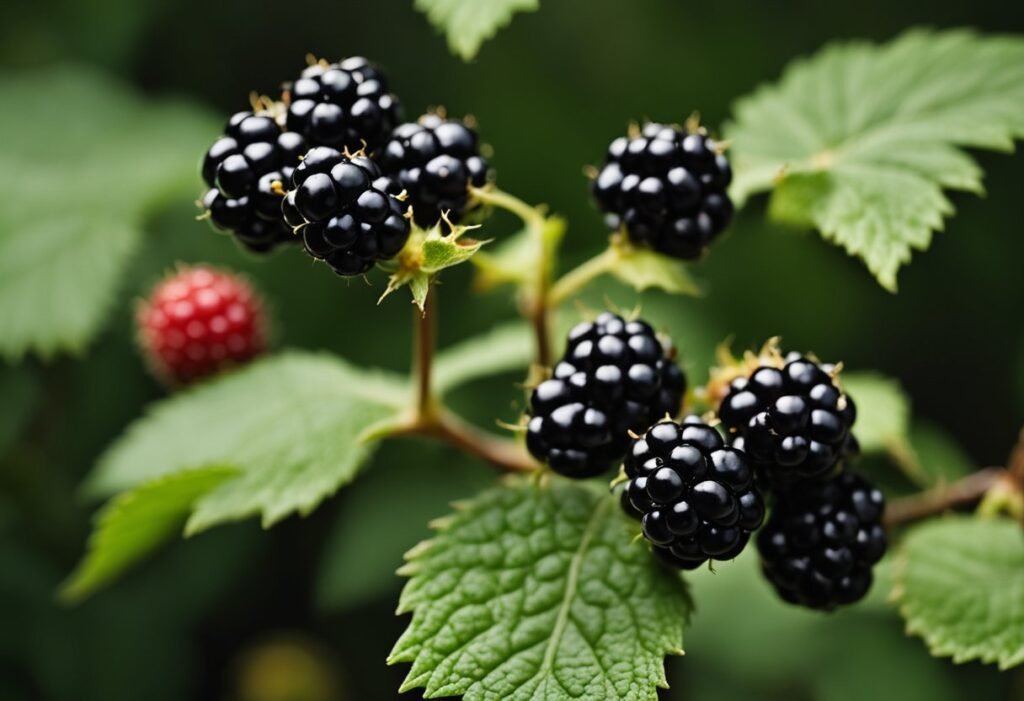
Blackberries are a type of fruit that belongs to the Rosaceae family. They are native to North America and are commonly found in the wild. Blackberries are usually dark purple or black in color, and they have a sweet and slightly tart taste.
Blackberries are a good source of vitamins C and K, fiber, and antioxidants. They are also low in calories, making them a healthy snack option.
When it comes to feeding blackberries to tortoises, it’s important to note that they should be given in moderation. While blackberries are safe for tortoises to eat, they should not make up a large portion of their diet. It’s always best to consult with a veterinarian or a reptile specialist to determine the best diet for your tortoise.
Understanding Tortoise Diet
When it comes to feeding our tortoise, it’s important to understand their natural diet. Tortoises are herbivores, which means they primarily eat plant-based foods. In the wild, tortoises consume a variety of leaves, flowers, and fruits.
One of the key components of a tortoise’s diet is fiber. Fiber helps to keep the digestive system healthy and functioning properly. A diet that is too low in fiber can lead to health problems such as constipation and diarrhea.
In addition to fiber, tortoises also require a variety of vitamins and minerals. These nutrients are essential for maintaining good health and preventing disease. Some of the key vitamins and minerals that tortoises need include calcium, vitamin D3, and vitamin A.
When it comes to feeding our tortoise, we should aim to provide a balanced diet that contains a variety of different foods. This can include dark leafy greens, vegetables, and fruits. However, it’s important to be cautious when feeding fruits to tortoises, as some can be high in sugar and should only be given in moderation.
Overall, a balanced and varied diet is essential for keeping our tortoise healthy and happy. By understanding their natural diet and nutritional needs, we can ensure that we are providing them with the best possible care.
Can Tortoises Eat Blackberries?

Blackberries are a nutritious fruit that is high in fiber, vitamin C, and antioxidants. However, when it comes to feeding them to tortoises, there are a few things to consider.
Firstly, it’s important to note that tortoises are herbivores and should only eat plant-based foods. While blackberries are safe for tortoises to eat, they should only be fed in moderation as they are high in sugar.
It’s also important to ensure that the blackberries are washed thoroughly before feeding them to your tortoise. This is to remove any pesticides or other harmful chemicals that may be present on the fruit.
When feeding blackberries to your tortoise, it’s best to cut them into small pieces to make them easier to eat. You can also mix them in with other fruits and vegetables to create a varied and balanced diet for your pet.
Overall, while blackberries can be a tasty and nutritious treat for tortoises, they should only be fed in moderation and as part of a balanced diet.
Health Benefits of Blackberries for Tortoises
Blackberries are a delicious and nutritious fruit that can be a great addition to a tortoise’s diet. Here are some of the health benefits of blackberries for tortoises:
- High in Fiber: Blackberries are a great source of fiber, which can help keep your tortoise’s digestive system healthy and regular.
- Rich in Vitamins and Minerals: Blackberries are loaded with vitamins and minerals that are important for your tortoise’s overall health. They are particularly high in vitamin C, which can help boost your tortoise’s immune system.
- Antioxidant Properties: Blackberries are rich in antioxidants, which can help protect your tortoise’s cells from damage caused by free radicals.
- Low in Calories: Blackberries are relatively low in calories, which makes them a great treat for your tortoise without adding too many extra calories to their diet.
When feeding your tortoise blackberries, it’s important to remember to wash them thoroughly and remove any stems or leaves. You should also only feed them in moderation, as too many blackberries can cause digestive issues. Overall, blackberries can be a healthy and tasty addition to your tortoise’s diet.
Potential Risks of Blackberries for Tortoises
Blackberries may seem like a healthy treat for tortoises, but they can pose some potential risks. Here are a few things to keep in mind before feeding your tortoise blackberries:
High Sugar Content
Blackberries are high in sugar, which can cause health problems for tortoises if they consume too much. Overconsumption of sugar can lead to obesity, diabetes, and other health issues.
Seeds
Blackberries have small seeds that can be difficult for tortoises to digest. These seeds can cause digestive problems, such as blockages or impactions, which can be life-threatening for tortoises.
Pesticides
Blackberries are often treated with pesticides, which can be harmful to tortoises if ingested. It’s important to thoroughly wash any blackberries before feeding them to your tortoise to remove any traces of pesticides.
Oxalic Acid
Blackberries contain oxalic acid, which can bind with calcium and prevent its absorption. This can lead to calcium deficiency and metabolic bone disease in tortoises.
In conclusion, while blackberries may seem like a tasty treat for tortoises, they can pose some potential risks. It’s important to feed blackberries in moderation and make sure they are thoroughly washed to remove any pesticides. Additionally, it’s important to monitor your tortoise for any signs of digestive problems or calcium deficiency if you choose to feed them blackberries.
How to Feed Blackberries to Tortoises
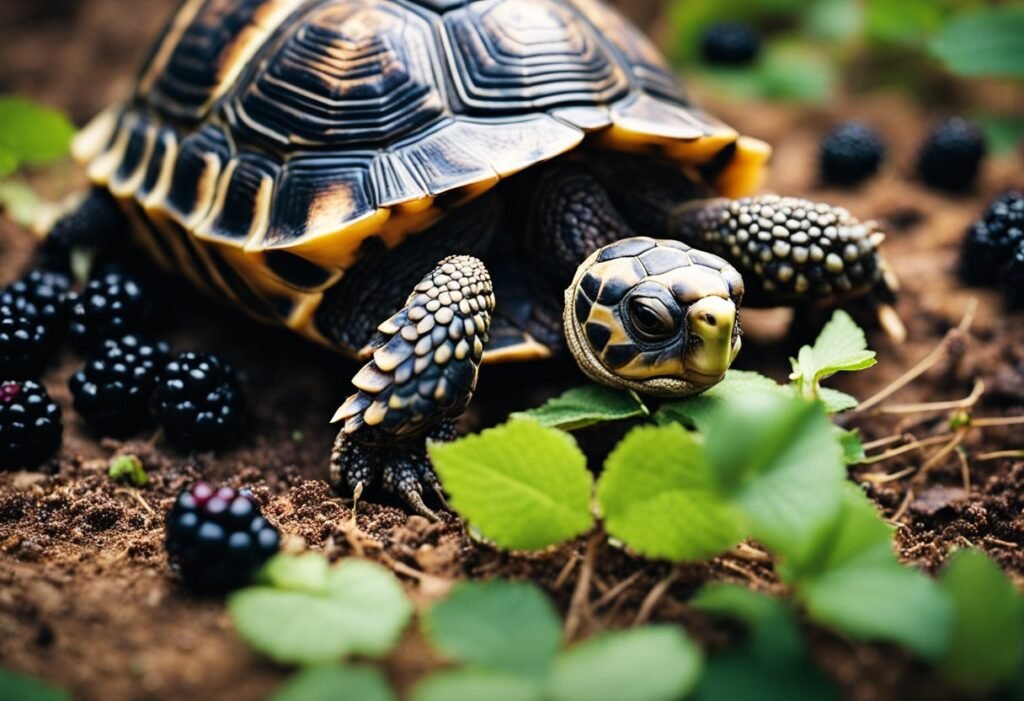
Feeding blackberries to tortoises can be a healthy and delicious treat for them. However, it is important to do it properly to avoid any health issues. Here are some tips on how to feed blackberries to tortoises:
Firstly, make sure to wash the blackberries thoroughly before feeding them to your tortoise. This will remove any pesticides, dirt, or other contaminants that could potentially harm your pet.
Secondly, it’s important to feed blackberries in moderation. While they are a great source of vitamins and minerals, too many blackberries can cause digestive issues for your tortoise. We recommend feeding them a few blackberries once or twice a week.
Thirdly, you can feed blackberries to your tortoise in a few different ways. You can give them whole blackberries, or you can mash them up and mix them with other fruits and vegetables. You can also add blackberries to their regular food to give it some extra flavor.
Lastly, make sure to remove any uneaten blackberries from your tortoise’s enclosure after a few hours. This will prevent them from spoiling and potentially causing health issues for your pet.
Overall, blackberries can be a healthy and tasty addition to your tortoise’s diet when fed in moderation and prepared properly.
Alternatives to Blackberries in Tortoise Diet
When it comes to feeding our tortoise, it’s important to offer a variety of foods to ensure they receive a balanced diet. While blackberries may be a tasty treat, there are plenty of other fruits and vegetables that can be included in their diet.
Here are some alternatives to blackberries that can be added to your tortoise’s diet:
- Leafy greens: Leafy greens such as kale, collard greens, and dandelion greens are excellent sources of vitamins and minerals for tortoises. They can be fed in small amounts daily.
- Fruits: Other fruits that are safe for tortoises to eat include strawberries, raspberries, blueberries, and apples. These should be fed in moderation as they are high in sugar.
- Vegetables: Vegetables such as carrots, squash, and green beans are also good options for tortoises. They should be chopped into small pieces to make it easier for them to eat.
- Herbs: Herbs such as basil, parsley, and cilantro can also be added to your tortoise’s diet. They provide a variety of vitamins and minerals and can be fed in small amounts.
It’s important to remember that while these foods are safe for tortoises to eat, they should be fed in moderation. Overfeeding can lead to obesity and other health problems. Additionally, it’s important to research the specific dietary needs of your tortoise species to ensure they are receiving the proper nutrients.
Conclusion
In conclusion, blackberries can be a healthy and nutritious addition to a tortoise’s diet, but they should be fed in moderation. They are a good source of vitamins and minerals, including vitamin C, vitamin K, and manganese. However, they are also high in sugar and should not be fed to tortoises on a regular basis.
When feeding blackberries to tortoises, it is important to wash them thoroughly and remove any stems or leaves. It is also recommended to cut them into small pieces to make them easier for the tortoise to eat.
While blackberries are generally safe for tortoises to eat, it is important to remember that every tortoise is different and may have individual dietary needs. If you have any concerns about feeding blackberries to your tortoise, it is best to consult with a veterinarian or reptile specialist.
Overall, blackberries can be a tasty and healthy treat for your tortoise, but they should be given in moderation as part of a balanced diet. As always, it is important to monitor your tortoise’s health and behavior and make adjustments to their diet as needed.
Frequently Asked Questions

What fruits can tortoises eat besides blackberries?
Tortoises can eat a variety of fruits, including strawberries, raspberries, apples, pears, and bananas. However, it’s important to remember that fruit should only make up a small portion of a tortoise’s diet.
Can tortoises safely consume blueberries?
Yes, blueberries are safe for tortoises to eat in moderation. They are a good source of antioxidants and vitamins.
Are there any vegetables that should be avoided in a tortoise’s diet?
Yes, there are some vegetables that should be avoided in a tortoise’s diet, such as spinach, chard, and beet greens. These vegetables contain high levels of oxalic acid, which can bind to calcium and prevent its absorption.
Can blackberry leaves be toxic to tortoises?
Blackberry leaves are not toxic to tortoises and can actually be a good source of fiber. However, it’s important to make sure that the leaves are free from any pesticides or chemicals.
Is it safe for red-footed tortoises to eat blackberries?
Yes, red-footed tortoises can safely eat blackberries in moderation. However, it’s important to remember that fruit should only make up a small portion of their diet.
What are some fruits that tortoises should avoid eating?
Tortoises should avoid eating fruits that are high in sugar, such as grapes, mangoes, and melons. These fruits can lead to obesity and other health problems if consumed in large quantities.

